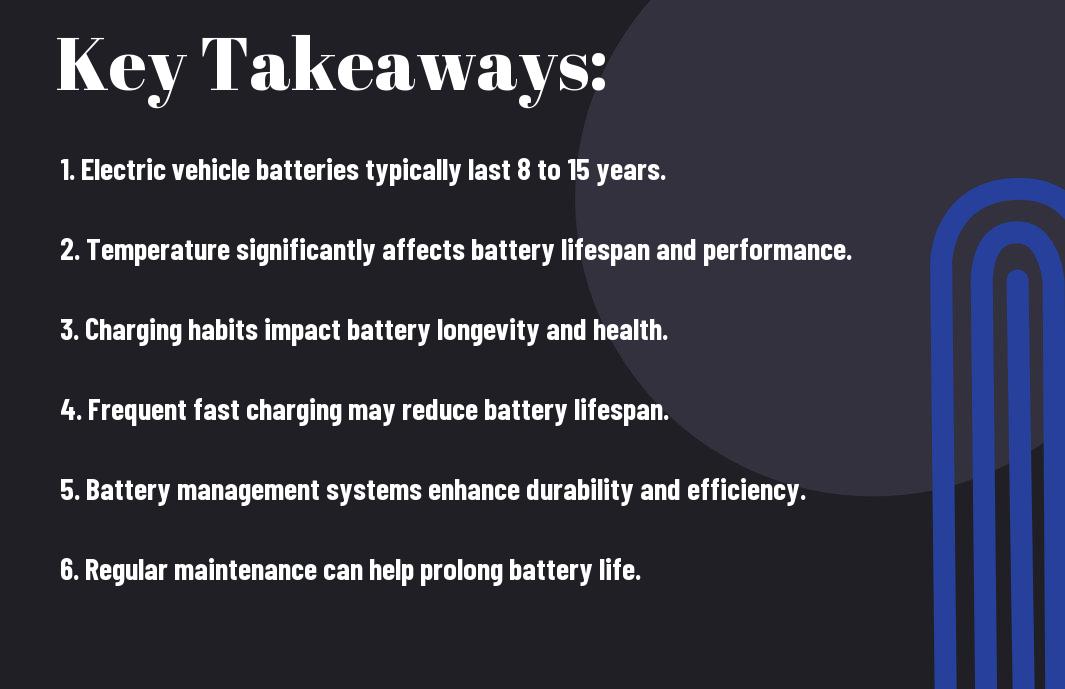There’s a growing interest in electric vehicles (EVs) as a sustainable transportation choice, prompting many to inquire about the longevity of EV batteries. He or she may wonder how long these batteries typically last and what specific factors influence their lifespan. Understanding these aspects is imperative for anyone considering the transition to electric mobility, as battery performance can significantly affect overall vehicle efficiency and ownership costs. This post explores into the average lifespan of electric vehicle batteries and the various elements that can impact their durability and effectiveness over time.


Understanding Electric Vehicle Batteries
Before delving into the specifics of electric vehicle batteries, it is vital to grasp their fundamental role in powering modern electric vehicles. These batteries are designed to store and supply the energy needed for propulsion, significantly influencing the vehicle’s performance, range, and longevity. A deeper understanding of their components will reveal how various factors can affect their overall lifespan and efficiency.
Types of Electric Vehicle Batteries
Before exploring the implications of battery technology, it’s important to recognize the various types of batteries used in electric vehicles:
- Lithium-ion Batteries
- Nickel-Metal Hydride Batteries
- Lead-acid Batteries
- Solid-state Batteries
- Lithium Iron Phosphate Batteries
Knowing the differences between these battery types can aid in making informed decisions when purchasing an electric vehicle or considering battery maintenance.
| Battery Type | Typical Lifespan |
| Lithium-ion | 8-15 years |
| Nickel-Metal Hydride | 6-10 years |
| Lead-acid | 3-6 years |
| Solid-state | 10+ years (potential) |
| Lithium Iron Phosphate | 8-12 years |
Battery Chemistry and Its Implications
Against the backdrop of various battery types lies the intricate world of battery chemistry, a key determinant of performance and longevity. The chemistry of the materials used in battery construction can significantly influence energy density, charging speed, and thermal stability. For instance, lithium-ion batteries often outperform older technologies due to their higher energy density and longer cycle life.
At the core of battery chemistry are the materials which determine the performance characteristics. Lithium-ion batteries are preferred in most electric vehicles because they provide a favorable combination of high energy density, lightweight construction, and longer lifespan compared to alternatives like lead-acid or nickel-metal hydride batteries. Each chemistry offers unique benefits and limitations, thus impacting maintenance, cost, and overall user experience. Understanding these nuances equips prospective electric vehicle owners with the knowledge necessary to make informed choices and enhance their vehicle’s performance longevity.
Average Lifespan of Electric Vehicle Batteries
You may wonder about the average lifespan of electric vehicle (EV) batteries, which typically lasts between 8 to 15 years, depending on various factors such as usage patterns and environmental conditions. Battery technology has improved significantly, leading to longer-lasting power sources that support the growing demand for electric vehicles.
Typical Lifespan Estimates
To assess battery longevity, many manufacturers estimate that EV batteries can maintain 70% to 80% of their capacity after 8 years or around 100,000 to 200,000 miles of driving. These estimates can vary widely based on model, usage, and maintenance practices.
Real-World Examples
To illustrate the lifespan of electric vehicle batteries, examples from various manufacturers can shed light on their performance over time. Many EV owners have reported maintaining healthy battery capacity even after several years of use, demonstrating the potential longevity of modern battery technology.
Indeed, case studies from Tesla and Nissan highlight that many users have experienced minimal battery degradation after several years on the road. For instance, a Tesla Model S has been recorded to lose only about 5% of its battery capacity after 200,000 miles. Similarly, Leaf owners often report a battery capacity reduction of around 10% after five years, showcasing the durability of these power sources in everyday use. These real-world examples emphasize the effectiveness of advancements in battery technology, reinforcing confidence in the longevity of electric vehicle batteries.

Factors Impacting Battery Lifespan
Once again, various factors influence the lifespan of electric vehicle batteries. These include:
- Driving habits and usage patterns
- Climate and environmental conditions
- Charging practices
Any one of these factors can significantly affect how long an electric vehicle’s battery will last. For more insights, visit How Long Do Electric Car Batteries Last?.
Driving Habits and Usage Patterns
Behind the wheel, an individual’s driving style can notably affect battery longevity. Aggressive acceleration, frequent hard braking, and high-speed driving may accelerate battery degradation.
Climate and Environmental Conditions
One of the less obvious influences on battery life is temperature. Extreme heat or cold can strain an electric vehicle’s battery, impacting its overall health and efficiency.
To ensure optimal performance, it is necessary to consider that temperatures above 95°F (35°C) or below 20°F (-6°C) can adversely affect battery capacity. Moreover, prolonged exposure to humidity may lead to corrosion, while salt from road treatments in winter could also pose risks to battery integrity.
Charging Practices
With proper charging practices, electric vehicle owners can extend the lifespan of their batteries. Consistently utilizing fast-charging stations or charging to full capacity can be detrimental.
This means that owners should aim to charge their batteries within recommended levels, ideally between 20% and 80%, and avoid letting them deplete completely. Regularly monitoring charging frequency and avoiding overnight charging can also benefit overall battery health.

Battery Maintenance and Care
Many factors contribute to the longevity of electric vehicle (EV) batteries, and proper maintenance plays a significant role. He or she should regularly check the battery’s condition and be mindful of temperature extremes, as these can affect performance. For more information on battery longevity, they can read about How long do electric car batteries last? [May 2023].
Best Practices for Longevity
Around 70-80% state of charge is ideal for daily driving, which helps prolong the battery’s lifespan. He or she should avoid letting the battery drain completely and try to keep it plugged in when not in use. This small change in routine can result in a significant impact over time.
Common Mistakes to Avoid
Against popular belief, frequent fast charging may not be in their best interest. He or she should minimize unnecessary fast charging instances as it can generate heat, which negatively affects battery life.
Mistakes in battery care may arise from misconceptions about charging habits and environment. He or she might overlook the significance of temperature regulation, as both extreme heat and cold can harm battery cells. By being cautious with charging techniques and optimizing their vehicle’s charging routine, they can enhance the battery’s performance and lifespan significantly.
Innovations in Battery Technology
Now, the landscape of electric vehicle batteries is rapidly evolving, driven by advancements in technology and research. Manufacturers are focusing on enhancing energy density, reducing charge time, and extending the overall lifespan of batteries. These innovations are not only contributing to improved vehicle performance but also addressing environmental concerns associated with battery production and disposal, propelling the industry forward.
Advancements in Battery Design
With recent developments, battery design has seen significant improvements that optimize efficiency, safety, and longevity. Innovations like solid-state batteries and advanced lithium-ion technologies enable higher energy storage while minimizing degradation. These advancements are paving the way for lighter, more compact batteries, which contribute to the overall performance of electric vehicles.
Future Trends and Expectations
Around the world, researchers and manufacturers are setting their sights on exciting future trends in electric vehicle battery technology. They aim to achieve greater sustainability through the use of recyclable materials and enhance charging infrastructure for fast, accessible energy replenishment.
Further exploration into next-generation battery technologies promises a transformative impact on electric vehicles. Many anticipate a shift towards solid-state batteries that offer increased safety and energy density. As the industry grapples with issues like battery disposal and environmental impact, innovative recycling processes are gaining attention. Subsequently, these advancements will likely not only improve battery lifespan but also create a more sustainable future for electric mobility.
Warranty and Replacement Considerations
Your understanding of electric vehicle (EV) battery warranties and replacement options is vital for planning long-term ownership. Most manufacturers offer warranties covering battery capacity for a certain number of miles or years, providing reassurance about battery longevity. Knowing the specifics of these warranties helps owners make informed decisions regarding maintenance and potential replacements down the line.
Understanding Battery Warranties
Across many leading EV manufacturers, battery warranties typically last between eight to ten years or up to 100,000 to 150,000 miles. Such warranties generally cover significant capacity loss, ensuring that the battery retains a certain percentage of its original range and performance. Reading the fine print will help owners understand what is protected and under what conditions, as some warranties may exclude normal wear due to outside factors.
Signs That Battery Replacement Is Needed
Above a noticeable reduction in driving range, several other indicators may suggest the need for battery replacement. These can include diminished performance during acceleration, unusual warning lights on the dashboard, or unexpected charging difficulties. Paying attention to these symptoms can prevent further issues and promote optimal vehicle functionality.
Replacement of an electric vehicle battery is warranted when indicators such as a significant drop in range, persistent warning alerts, or issues with charging are observed consistently. Owners should keep track of performance changes and seek diagnostic assessments from qualified technicians if they notice abnormalities. Taking proactive steps can facilitate timely replacements, ultimately extending the life of the vehicle and ensuring a seamless driving experience.
Final Words
Considering all points, one can conclude that the lifespan of electric vehicle batteries typically ranges between 8 to 15 years, impacted by factors such as usage patterns, environmental conditions, and charging habits. To ensure optimal longevity, individuals should adopt best practices in maintenance and usage. Comprehensive insights on this topic can be found in the article How Long Do Electric Car Batteries Last?. By understanding these elements, she or he can make informed decisions regarding electric vehicle ownership.



